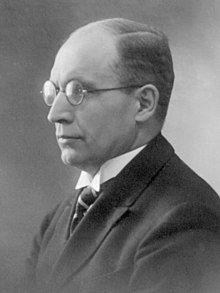Jüri Uluots
Jüri Uluots (born January 1 . Jul / 13. January 1890 greg. In Kirbla , community Lihula , Lääne / Estonia ; † 9. January 1945 in Stockholm / Sweden ) was an Estonian lawyer and politician. He was Prime Minister of the Republic of Estonia from 1939 to 1940 and head of the Estonian constitutional government from 1940 to 1945 due to the deportation of President Päts.
jurist
Jüri Uluots graduated from high school in Pärnu and studied law at the University of St. Petersburg from 1910 to 1918 . He then taught Estonian and Roman law at the University of Tartu until 1944 . From 1924 to 1931 he was Dean of the Law Faculty of the University of Tartu. 1919/20 Uluots was editor of the Estonian newspaper " Kaja " ( Echo ) and 1937/38 editor-in-chief of the newspaper Postimees .
Politician
From 1920 to 1926 and from 1929 to 1932 Uluots was a member of the Estonian Parliament ( Riigikogu ). From 1937 to 1940 he was chairman of the Fatherland Union , the only authorized party, under the authoritarian ruling President Päts . From October 12, 1939 to the occupation of Estonia by the Soviet Union on June 17, 1940, he was Prime Minister of the Republic of Estonia.
With the arrest and deportation of the constitutional president Konstantin Päts by the Soviet authorities, Jüri Uluots became de jure prime minister with the duties of president according to the Estonian constitution of 1938 . He held this office until his death in 1945.
Second World War
When the German armed forces march in, Uluots tries in vain to re-establish an independent Estonian government. However, this was not recognized by the German occupying power. Uluots therefore initially refused to cooperate with the German occupiers. When the front had reached Estonia's eastern border again in early 1944, the German military commanders proclaimed compulsory military service for all residents of Estonia on January 31, 1944. In a radio address on February 7, 1944, Uluots called on those born between 1904 and 1923 to volunteer for the Estonian associations to fight alongside the Wehrmacht against the Red Army . Several 10,000 Estonians responded to the call.
Between the withdrawal of the Wehrmacht from Estonia and the approaching Red Army , Uluots , who was already seriously ill with cancer , formed a new Estonian government on September 18, 1944 under Otto Tief . The Soviet Union executed some members of the government. Others, including Uluots on September 20, 1944, managed to escape to Sweden , where the Estonian government in exile was based until 1992.
Posthumously
In a ceremony on August 31, 2008, Jüri Uluots was born in his hometown of Kirbla together with his wife Anette, b. Tobber (born June 26, 1901 in Vana-Tänassilma, Viljandi district; † June 9, 1995 in Stockholm) and his son Jüri-Erik (born September 19, 1930 in Tartu; † June 1, 2006 in Stockholm) were buried after the The family's remains were exhumed on May 10, 2008 at the Stockholm Forest Cemetery and transferred to Estonia on May 13, 2008. The only daughter, Viia (born April 9, 1927 in Tartu; † March 4, 1987 in Zurich ), married Wiget, is buried in Zurich.
literature
- Karl Heinz Gräfe: From the thunder cross to the swastika. The Baltic States between dictatorship and occupation . Edition Organon, Berlin 2010, ISBN 978-3-931034-11-5 , short biography p. 441 f.
Web links
- Biography of the Estonian the Presidential (English)
- Uluots, Jüri , short biography (English) on Estonica.org
Individual evidence
- ↑ Entry in the baptismal register of the parish Leal (Estonian: Lihula kogudus)
| personal data | |
|---|---|
| SURNAME | Uluots, Jüri |
| BRIEF DESCRIPTION | Estonian lawyer and politician |
| DATE OF BIRTH | January 13, 1890 |
| PLACE OF BIRTH | Kirbla, Lääne County |
| DATE OF DEATH | January 9, 1945 |
| Place of death | Stockholm |

